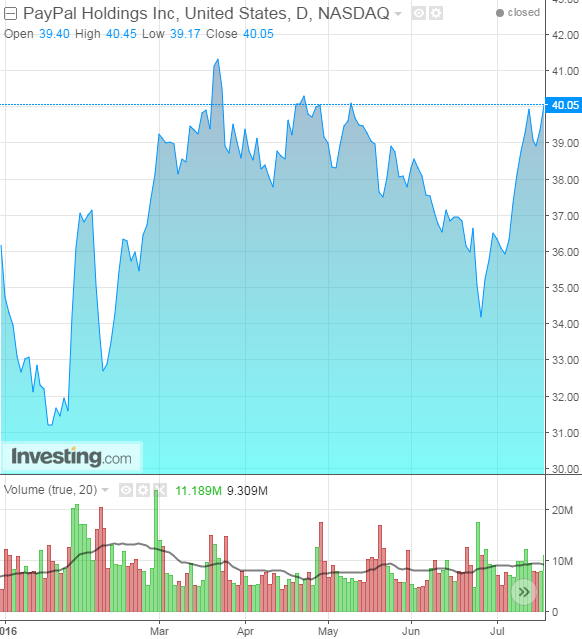by Clement Thibault
Internet payment company PayPal Holdings Inc (NASDAQ:PYPL) reports on Thursday, July 21, after the close.

1. Success post-eBay
At the end of September 2014 eBay (NASDAQ:EBAY) decided to spin-off PayPal, which it bought in 2002, as part of an attempt to refine and rebalance its various business ventures. PayPal began trading publicly on July 20, 2015. At that IPO—PYPL's second time in the markets; it had been publicly traded prior to the eBay acquisition—it was valued at $46.6B. Since then, PayPal has been profitable and its revenue is growing. It has eclipsed eBay's market cap, and is now worth $47B compared to its former parent's $30B. PayPal's shares are trading at $40.05, a little below to its all time high of $42.55, reached on the day it IPO'd.
2. Revenue and earnings forecasts
PayPal's forecast for this earnings season is $0.36 EPS and $2.6B in revenue. Because the company was spun off from eBay exactly a year ago, there is no comparable quarter for last year. However, given the information available from the company's past three quarters, it seems clear that analysts have been quite accurate in their predictions for PayPal's quarterly numbers. Until now, the biggest departure from consensus was the 5.8% in earnings reported on PayPal's first post-IPO report, and a 2% deviation in revenue on its Q4 '15, second, report. In other words, the company is a steady performer and to date has pulled no punches. We have no reason to believe this time will be any different.
3. Competitive threats: existing and in development
Though PayPal's business is percolating, they're clearly vulnerable to a variety of competitive threats in the longer term. Right now their primary competitor appears to be Apple's (NASDAQ:AAPL) Apple Pay app. AAPL recently announced it would roll out the app to stores as well, and has made it available in 9 countries so far.
No surprise, Google (NASDAQ:GOOGL) announced in May that it is working to bring its own Android Pay to desktops too, although details regarding when and how are scarce at the moment. Both companies have indicated that their enhanced payment technologies will become available toward the end-of-year holiday season, so Q4 reports will surely be worth watching.
According to comScore, a global media measurement and analytics company which monitors performance in this arena, retailers had 20% more traffic via mobile websites than via apps this past year, with desktop sites far ahead of both when it comes to online shopping. This will undoubtedly steal market share from PayPal.
Along with tech giants Apple and Google, there are a variety of other, smaller competitors operating in this market such as privately held companies WePay and 2CheckOut, as well as the recent IPO Square (NYSE:SQ).
For now, we see PayPal continuing to enjoy its position as industry leader, but between competition from established credit card companies—which would prefer it didn't exist since it's taking fees that in the past would have gone to them instead—and in-development up-and-coming technology, PayPal will be forced to significantly increase its innovation efforts in order to maintain its lead...and market share.
4. Possible Visa acquisition next?
Rumors of PayPal being acquired are nothing new. In the past there was buzz about interest from Apple, then from American Express (NYSE:AXP), and more recently from Mastercard (NYSE:MA). The latest rumblings are linked to Visa (NYSE:V). The sense that something must be going on between the two companies appears to largely stem from PayPal moving its earnings report announcement to the same day as Visa's report, July 21.
Since there's little chance the change in date of the earnings releases is coincidental, here are a few possible scenarios that could be about to play out:
A) PayPal could be acquired by Visa. Shares of PayPal are trading at a pretty expensive P/E ratio of 36. A premium added by a possible Visa acquisition makes this deal expensive and therefore unlikely.
B) An announcement of a partnership between the two companies, where fees are reduced or a premium will be given to PayPal based on volume.
C) Visa announces it has decided to go head-to-head with PayPal and impose fees on PayPal transactions in order to discourage Visa holders from using PayPal.
It may be none of the above, but it does appear something could be about to happen between the two companies.
Conclusion
PayPal's current earnings are not a big concern, since the company has been solid in its reporting until now. The one thing to pay attention to is its current valuation, which should be considered too high if profits stagnate. Since PayPal is the current industry leader, it wouldn't be a surprise to see investors settling for just revenue growth.
Going forward though, to hold on to its valuation, PayPal will have to innovate in order to dominate, something that will be increasingly hard to do with players such as Apple and Google looking to grab a share of the profits. At this stage, innovation is likely to come from acquisition, such as its 2013 purchase of payment company Braintree, or money transfer business Xoom, which PYPL bought in late 2015.
